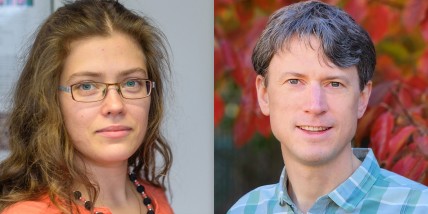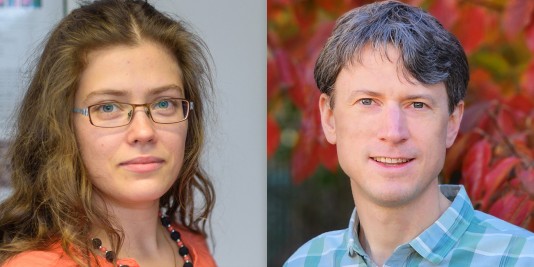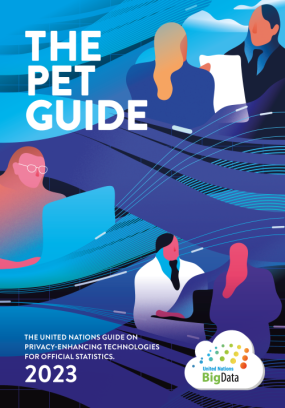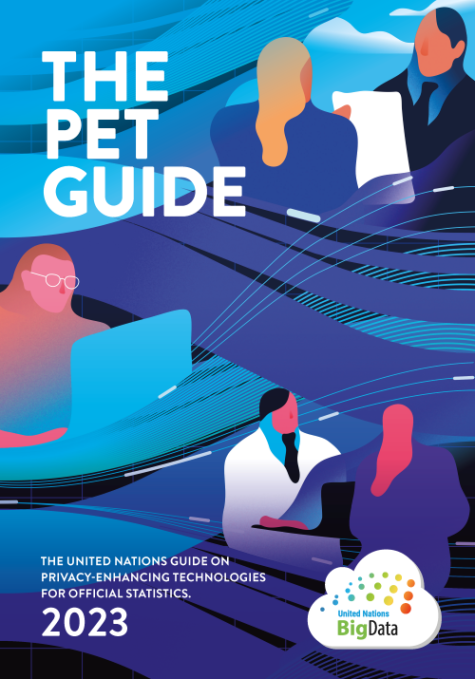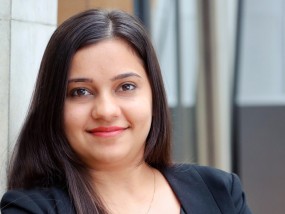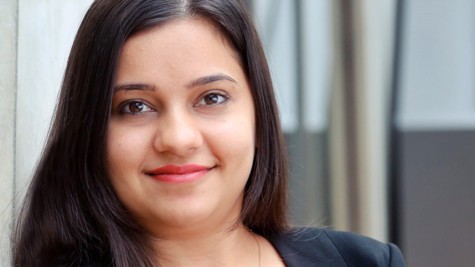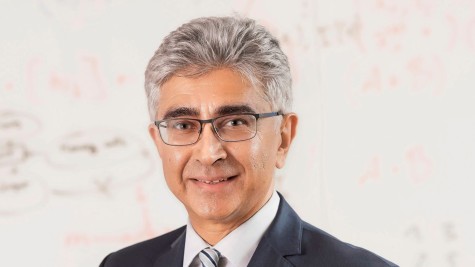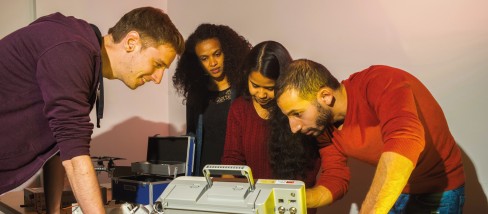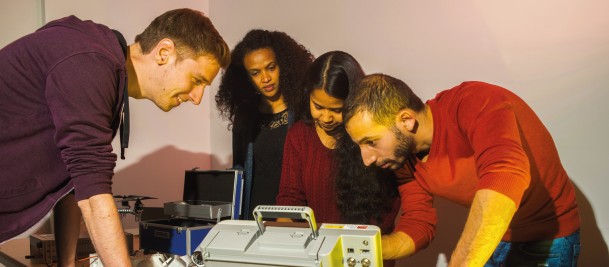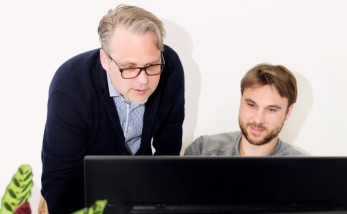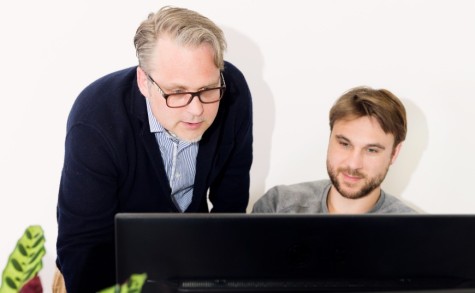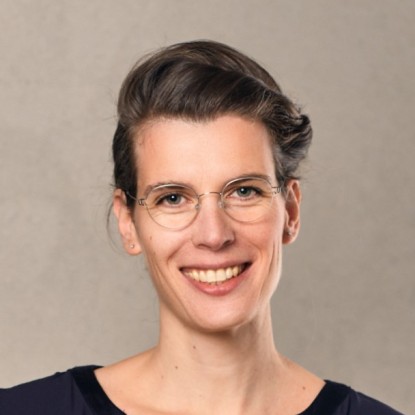-
![Prof. Dr. Anna Rohrbach und Prof. Dr. Marcus Rohrbach]() Picture: Privat
Picture: Privat![Prof. Dr. Anna Rohrbach und Prof. Dr. Marcus Rohrbach]() Picture: Privat
Picture: PrivatResearch for trustworthy AI
2023/02/21
Department receives two new LOEWE professorships
The Technical University of Darmstadt continues to expand its leading international position in artificial intelligence (AI) research: The Department of Computer Science receives no less than two new LOEWE professorships for multimodal learning. One LOEWE Top Professorship is awarded to Dr Marcus Rohrbach, who is at the same time taking up his Humboldt Professorship at TU Darmstadt, and one LOEWE Start Professorship to Dr Anna Rohrbach. Both LOEWE professorships are funded with funds from the LOEWE research programme of the State of Hesse totalling five million euros.
-
![]()
![]()
UN guide includes privacy tools developed in ENCRYPTO Group
2023/02/21
Multi-Party Computation frameworks ABY and MOTION
The United Nation's Committee of Experts on Big Data and Data Science for Official Statistics has released its “Guide on Privacy-Enhancing Technologies (PETs) for Official Statistics”. The guide includes two tools from the ENCRYPTO research group of Professor Thomas Schneider at TU Darmstadt.
-
![Prof. Dominik L. Michels]()
![Prof. Dominik L. Michels]()
New at the department: Prof. Dr. Dominik L. Michels
2023/01/26
Intelligent Algorithms in Modeling and Simulation (IAMS) Group
Since January 1, Dominik L. Michels is professor for Intelligent Algorithms in Modeling and Simulation at the Department of Computer Science at TU Darmstadt. His research aims for the development of principled computational methods targeting simulation tasks in the fields of Visual and Scientific Computing. This is based on solid theoretical foundations resulting from fundamental research comprising Algorithmics, Artificial Intelligence, Computer Algebra, Machine Learning, Mathematical Modeling, and Numerical Analysis.
-
![]()
![]()
Dissertation Award for Dr. Manisha Luthra
2022/11/30
GI/ITG special interest group KuVS honors postdoc for research in the field of distributed systems
Dr. Manisha Luthra, a post-doctoral researcher in professor Carsten Binnig's research group Data and AI Systems (Systems Group), has been awarded the KuVS Award for her 2021 doctoral dissertation. The award of the special interest group Communication and Distributed Systems (KuVS) is jointly presented by the Gesellschaft für Informatik (GI) and the Informationstechnische Gesellschaft im VDE e.V. (ITG).
-
![]() Picture: Daniela Fleckenstein
Picture: Daniela Fleckenstein![]() Picture: Daniela Fleckenstein
Picture: Daniela FleckensteinNew managing director at the department
2022/11/30
Dr.-Ing- Doreen Böhnstedt
Dr.-Ing. Doreen Böhnstedt has been Managing Director of the Department of Computer Science since November 1, 2022. She holds a doctorate from the Department of Electrical Engineering and Information Technology (etit) at TU Darmstadt and, among other things, led a research group in the field of distributed sensor networks at the “Multimedia Communication” department for several years. We asked Dr. Böhnstedt about her work:
-
![]() Picture: privat
Picture: privat![]() Picture: privat
Picture: privatExpertise for interaction between humans and AI
2022/11/23
Third Alexander von Humboldt Professorship for TU Darmstadt – Dr Marcus Rohrbach awarded
The Alexander von Humboldt Foundation has once again granted TU Darmstadt a Humboldt Professorship, Germany’s most highly endowed research award. The winner Dr Marcus Rohrbach – an expert in multimodal learning who was nominated by TU now has the chance to conduct research as a Humboldt Professor of Artificial Intelligence (AI) at the TU and at the Hessian Centre for Artificial Intelligence (hessian.AI). He reinforces a field of research in which the Technical University of Darmstadt plays a leading international role.
-
![Portrait von Ahmad-Reza Sadeghi, Informatikprofessor an der TU Darmstadt]()
![Portrait von Ahmad-Reza Sadeghi, Informatikprofessor an der TU Darmstadt]()
Data Protection for AI
2022/10/13
Prof. Ahmad-Reza Sadeghi as expert advisor on distributed machine learning
Machine learning systems are increasingly being integrated in many processes of our society and economy. For example, machine learning algorithms take on important functions in driverless vehicles or digital healthcare. In these areas of application, AI systems must not only make reliable predictions, but also resist attacks and manipulation to ensure privacy of sometimes sensitive data as well as maintain trust in the technology.
-
![Jan Peters bedient Roboterarme, die Kinderstuhl halten]() Picture: Katrin Binner
Picture: Katrin Binner![Jan Peters bedient Roboterarme, die Kinderstuhl halten]() Picture: Katrin Binner
Picture: Katrin BinnerAward for robotics expert
2022/07/19
Prof. Jan Peters brings first Amazon Research Award to TU Darmstadt
For a research project on “Learning Robot Manipulation from Tactile Feedback”, the Autonomous Intelligent Systems department of computer science professor and hessian.AI founding member Jan Peters has been awarded an Amazon Research Awards (ARA) 2021. As announced by the company on 18 July 2022, the team will receive funding of approximately $95,000, as well as access to selected Amazon research infrastructure. The award will support the work of one to two PhD students or postdocs for one year.
-
![]() Picture: Jan-Christoph Hartung
Picture: Jan-Christoph Hartung![]() Picture: Jan-Christoph Hartung
Picture: Jan-Christoph HartungFunding of CROSSING extended until 2026
2022/05/27
Third funding phase includes new project area “Transfer”
The Collaborative Research Center CROSSING continues into its third funding period. The Grants Committee of the Deutsche Forschungsgemeinschaft (DFG, German Research Foundation) agreed to extend the funding until the end of June 2026 to research and develop cryptography-based security solutions enabling trust in new and next generation computing environments.
-
![Bibel, Wolfgang]() Picture: Nora Bibel
Picture: Nora Bibel![Bibel, Wolfgang]() Picture: Nora Bibel
Picture: Nora BibelOut of the niche, on to international fame
2022/05/18
50 years Department of Computer Science: Interview with Emeritus Professor Wolfgang Bibel
He is regarded as one of the top ten personalities in German AI history: Wolfgang Bibel, professor emeritus of TU Darmstadt, was one of the first scientists in Germany to conduct research in the area of Artificial Intelligence, achieving international recognition. As professor for Intellectics and an expert for deduction, he was for two decades a leading figure and formative force of the Department of Computer Science at TU Darmstadt, which celebrates its 50th anniversary in 2022, and he laid the foundation for the department’s leading position in AI research.
-
![Portrait von Iryna Gurevych, Informatikprofessorin an der TU Darmstadt]() Picture: Rüdiger Dunker
Picture: Rüdiger Dunker![Portrait von Iryna Gurevych, Informatikprofessorin an der TU Darmstadt]() Picture: Rüdiger Dunker
Picture: Rüdiger DunkerERC Advanced Grant awarded to Prof. Iryna Gurevych
2022/04/26
European Union Funds AI Project for Innovative Analysis of Text
Professor Iryna Gurevych wins one of the highly-coveted “ERC Advanced Grants” and receives 2.5 million euros from the European Research Council (ERC) for her project “InterText – Modeling Text as a Living Object in a Cross-Document Context”.
-
![Portrait von Ahmad-Reza Sadeghi, Informatikprofessor an der TU Darmstadt]() Picture: Klaus Mai
Picture: Klaus Mai![Portrait von Ahmad-Reza Sadeghi, Informatikprofessor an der TU Darmstadt]() Picture: Klaus Mai
Picture: Klaus MaiProf. Ahmad-Reza Sadeghi awarded ERC Advanced Grant
2022/04/26
Radical approach for sustainable security
Ahmad-Reza Sadeghi, Professor of System Security at the Technical University of Darmstadt, has been awarded a prestigious “ERC Advanced Grant” by the European Research Council (ERC). His research project HYDRANOS is being funded with around 2.5 million euros over a period of five years.
-
![]() Picture: CAST e.V. / Gesellschaft für Informatik e.V.
Picture: CAST e.V. / Gesellschaft für Informatik e.V.![]() Picture: CAST e.V. / Gesellschaft für Informatik e.V.
Picture: CAST e.V. / Gesellschaft für Informatik e.V.CAST/GI Promotionspreis IT-Sicherheit 2022 for alumna
2022/04/07
Dr. Kristina Hostáková recognized with first place for dissertation
As part of the conference “GI Sicherheit 2022”, the CAST/GI Promotionspreis IT-Sicherheit 2022 was awarded at the Karlsruhe Institute of Technology. Dr. Kristina Hostáková, an alumna of our department, took first place.
-
![Prof. Kersting und Patrick Schramowski]() Picture: Katrin Binner
Picture: Katrin Binner![Prof. Kersting und Patrick Schramowski]() Picture: Katrin Binner
Picture: Katrin BinnerTactful machines
2022/03/28
How to “detox” potentially offensive language from an AI
Researchers from the Artificial Intelligence and Machine Learning Lab at the Technical University of Darmstadt demonstrate that artificial intelligence language systems also learn human concepts of “good” and “bad”. The results have now been published in the journal “Nature Machine Intelligence”.
-
![Jan Peters bedient Roboterarme, die Kinderstuhl halten]() Picture: Katrin Binner
Picture: Katrin Binner![Jan Peters bedient Roboterarme, die Kinderstuhl halten]() Picture: Katrin Binner
Picture: Katrin BinnerTake breakthrough technologies from the lab into the real world
2022/03/18
First Transition Grant of the European Innovation Council goes to TU Darmstadt
For its new Transition Grant, the European Innovation Council (EIC) has for the first time selected 42 projects from 292 proposals to receive a total of €99 million in EU funding. The very first Transition Grant goes with the highest possible score to computer science professor Jan Peters and his team at the Intelligent Autonomous Systems Group. For their pioneering project “Visual Robot Programming”, they will receive funding of over 1 million euros over two years.
Computer Science
News
Archive

